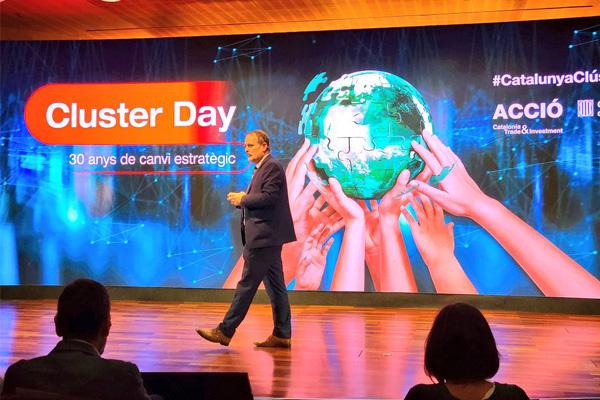Catalonia Celebrates 30 years of Clusters Policy
ACCELERATE GDT partner ACCIÓ celebrated 30 years of cluster policy, and implementing the business strategies of tomorrow in December 2022.
The Catalunya Clústers program celebrates 30 years. Three decades of fostering strategic change, continuous improvement, international connections and the drive for shared value by focusing on sustainability, talent management or responsible consumption.
The second edition of Cluster Day, the central day of the cluster ecosystem in Catalonia took place on the 16th of December 2022, and has served to highlight the work done and the cluster strategies of tomorrow.
Two global pioneers and local stakeholders led the discuussions. On the one hand, two pioneers in the field of clusters Emilià Duch, from the World Bank and Christian Ketels from the Harvard Business School gave excellent keynote addresses.
Christian Ketels, professor at Harvard Business School, was one of the main speakers at Cluster Day 2022 to take stock of the 30 years of cluster policy in Catalonia. In his presentation during Cluster Day 2022, Christian Ketels looks back to talk about the beginnings of cluster policy in Catalonia, where it come from and how it has changed. "It is remarkable that the Catalan cluster policy has remained relevant for so long. Surely as a result of maintaining the key elements and the ability to continuously adapt to the new challenges", he acknowledged.
Some of the keys for Ketels is that the Catalan clusters have allowed companies to better understand the market and its environment and to improve, at the same time, their strategy and their development. "The cluster policy makes it possible to create a different dialogue between the different actors that would otherwise be difficult," explains Ketels.
The Harvard Business School professor points out some specific keys that have pushed the Catalan clusters to success. To begin with, Ketels points out the openness of business managers to discuss strategy with each other and to create a good atmosphere within the clusters; it also highlights that they all look for common benefits beyond those of the company itself; the ability of managerial clusters to speak different languages depending on who is in front of them: universities, companies or governments; and the support of the administration through ACCIÓ. "All in all it's hard to find for so many years."
Christian Ketels also emphasizes the role of the cluster ecosystem at an international level with links to entities such as TCI Network, among others, and also talks about the future and the positioning of clusters in the great global challenges we face in the face of climate change, geopolitical tensions or the rise of servitization, among others.
Emilià Duch , considered the intellectual father of the start-up of work in clusters in our country, also participated in the Cluster Day, where he gave the presentation "From the invisible hand to enlightened governments ". Duch currently works for the World Bank, as Lead Private Sector Specialist in the Global Markets and Technology Unit.
He himself analyzes the learnings of these 30 years of clusters. "Learning from others no matter where they are from" or the "ability to influence the country's business policies", are some of the keys he has mentioned in reference to the work carried out by the Catalan clusters. Duch also refers to the roots of the clusters in the territory: "The clusters in Catalonia are a combination of territory and society, of people. You need to understand who is behind it," he explains.
On the other hand, companies that are part of our home clusters such as Eurecat, Frit Ravich, HP, Sensofar, Marinva, Bodegas Torres, Avinent and the Modacc cluster will analyze technological change and the importance of applying shared value strategies.
The 30 years of the Catalunya Clústers program is a historical milestone within the reach of few regions and which demonstrates the good health of an initiative that has become a means of business transformation and which already has 26 clusters that bring together 2,600 companies.
For further information on the Cluster Days – click here.
